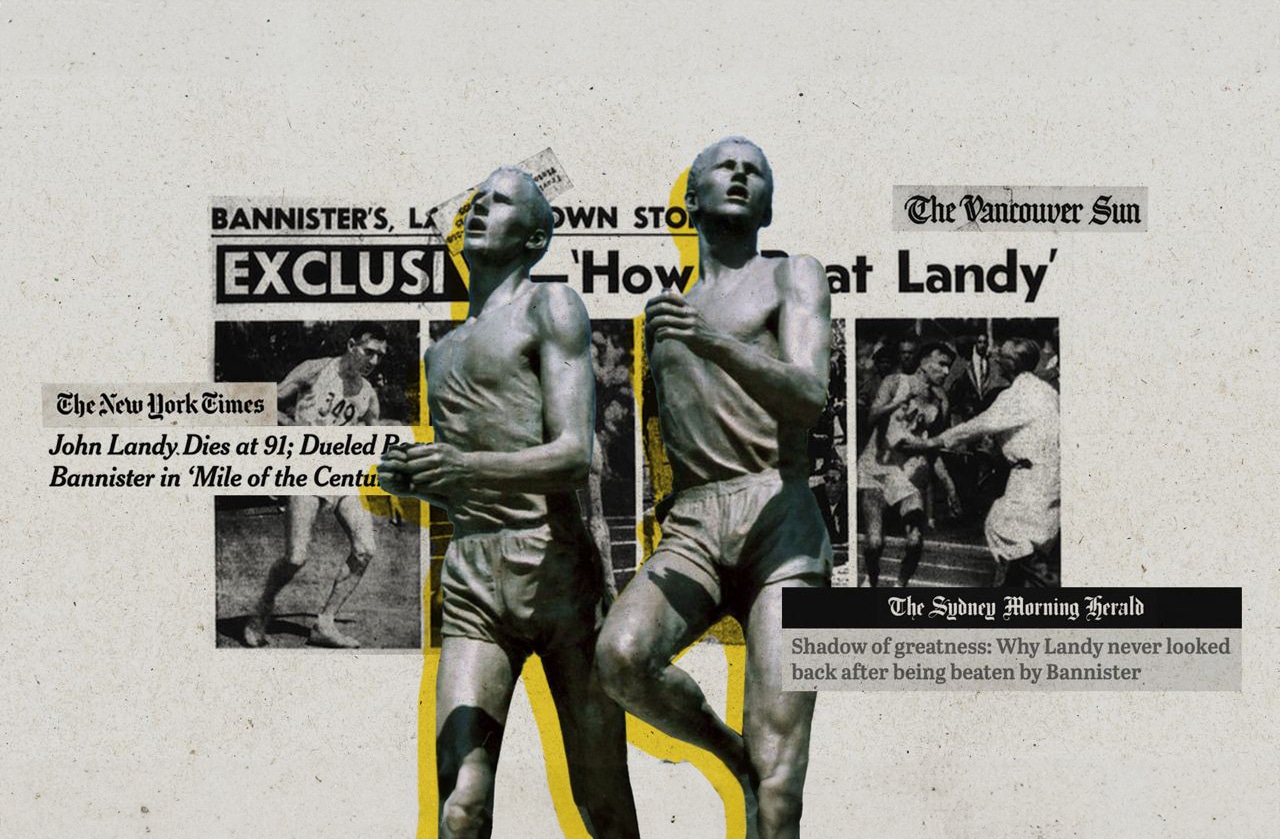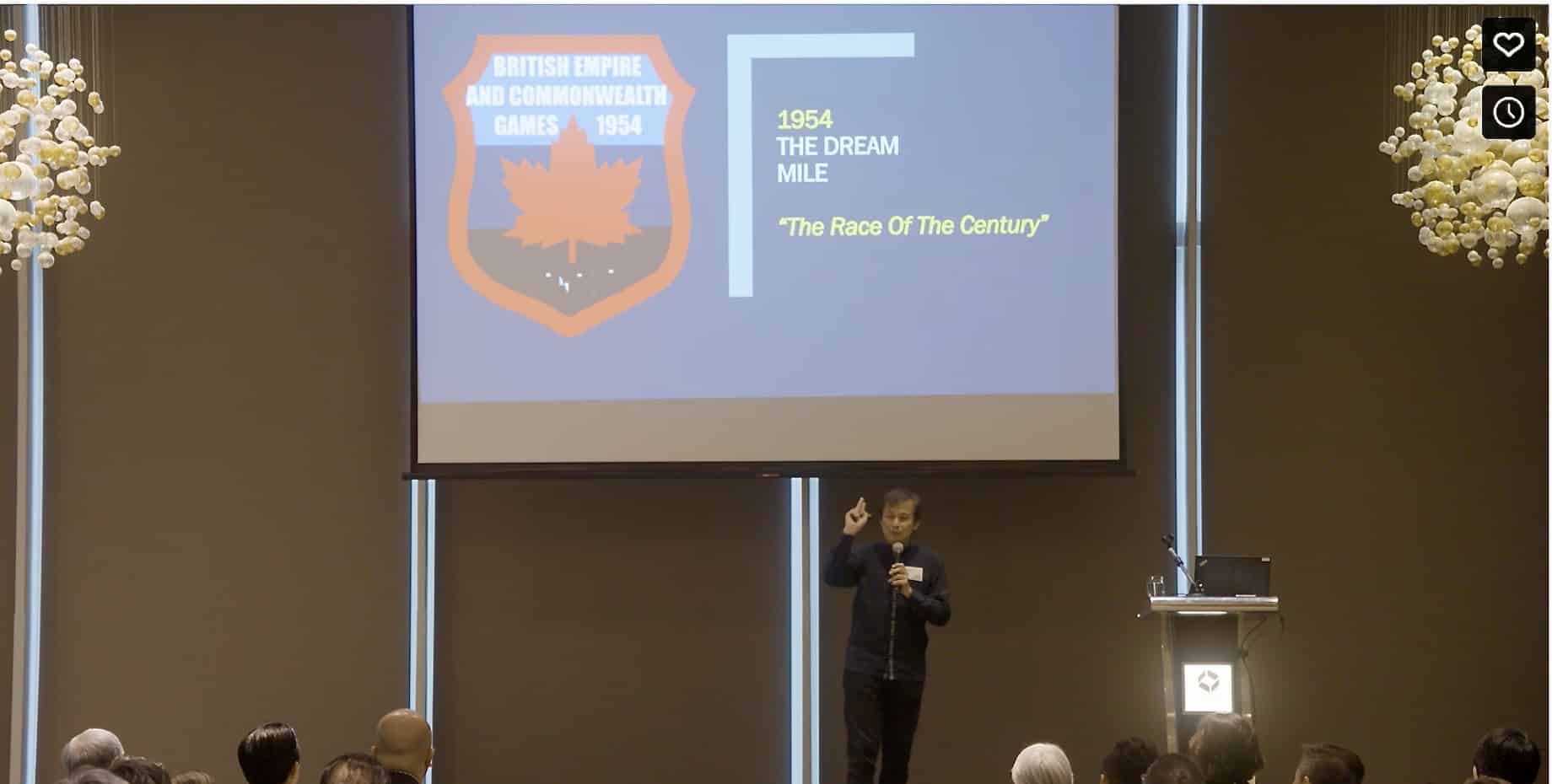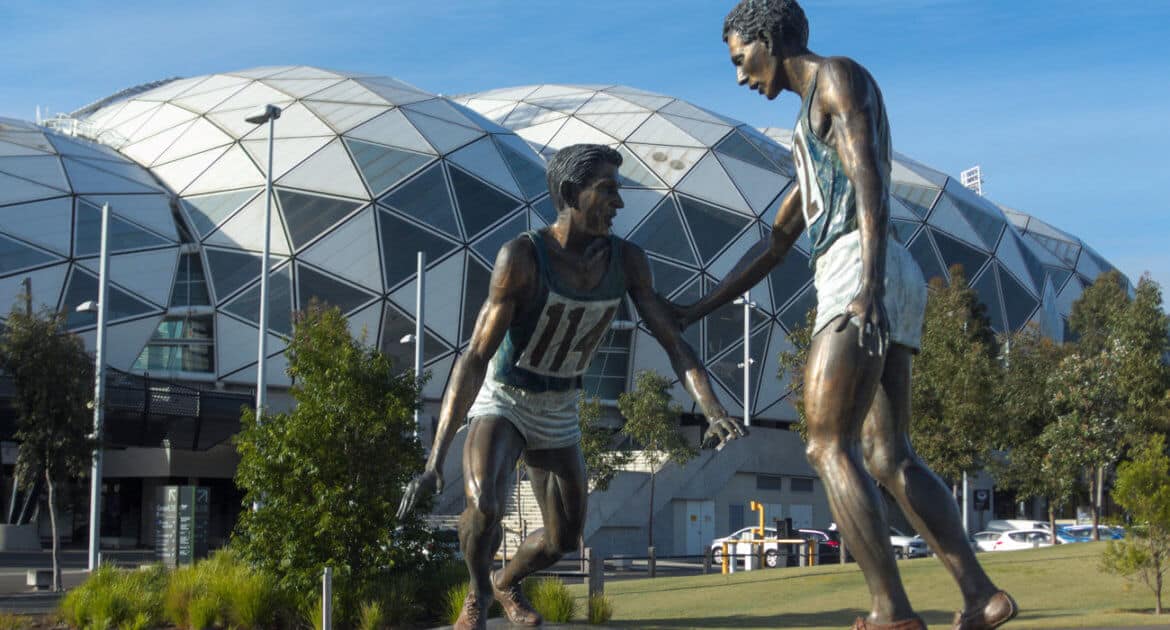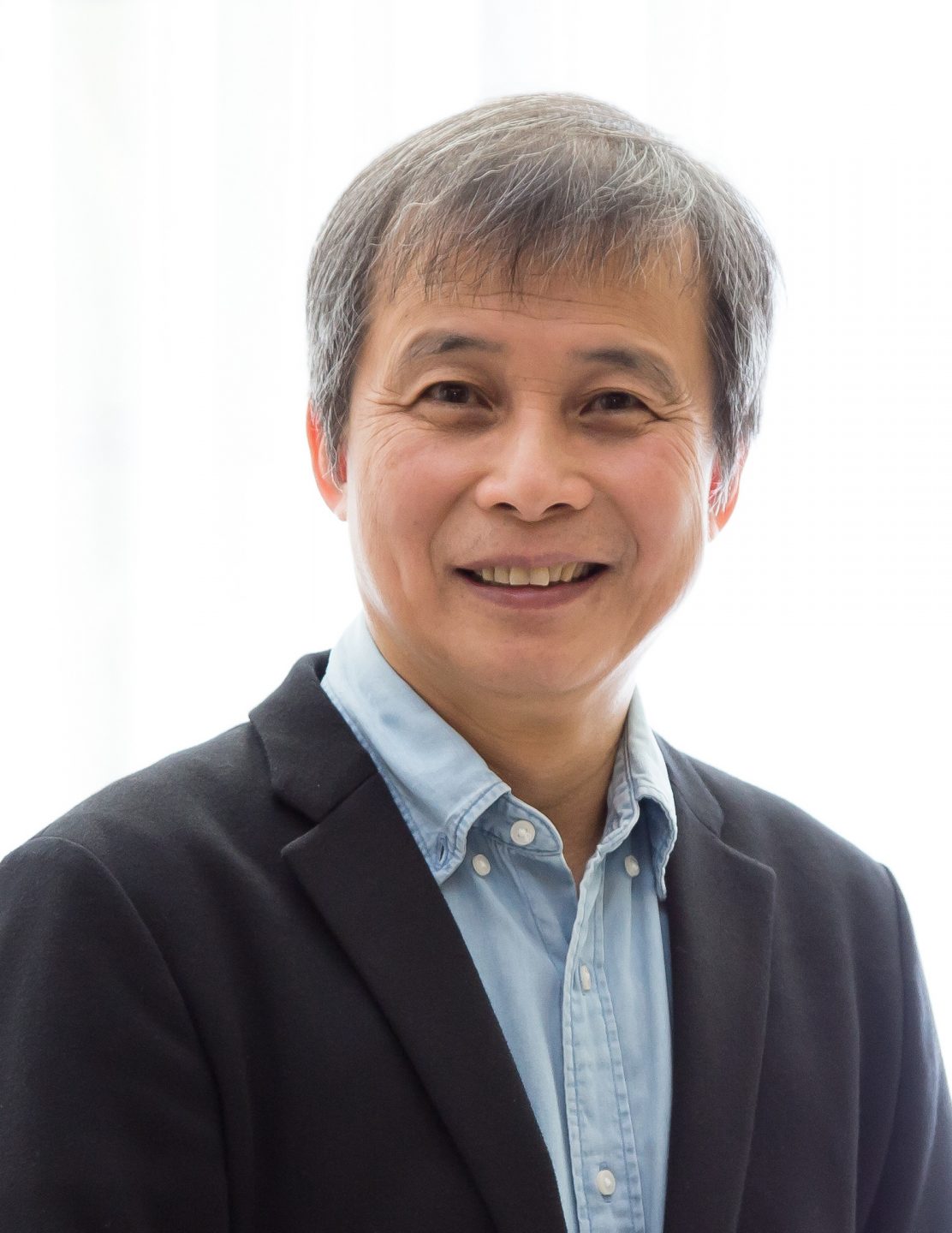3 Lessons from how the fastest man in the world ran his race
Ps-Dr Philip Lyn // September 19, 2023, 1:59 pm

Ps-Dr Philip Lyn relates Philippians 3:13-14 to how record breaker John Landy ran on in life after a historic failure that was immortalised in a bronze statue that still stands in Vancouver today. Photo composite by Nicole Chan. Photo of bronze statue by Paul Joseph.
Running a mile under four minutes was a feat once not thought humanly possible.
Englishman Roger Bannister became the first man to smash that barrier on May 6, 1956. Just 46 days later, Australian John Landy slashed another one-and-a-half seconds off that record.
“How would you like your failure to be cast forever in a bronze statue?”
Two months later, the first two men to do the unthinkable were set to run against each other in a race known as the Dream Mile.
A hundred million people tuned into their radios and black-and-white TV sets to witness the race of the century at the British Empire and Commonwealth Games in Vancouver.
From the time the gun went off, John Landy led for the first three-and-a-half rounds, with Bannister just behind him.
At the final turn of the last lap, John Landy heard Bannister sprinting behind him, and looked over his left shoulder.
Bannister passed him on the right, sprinted down the straight and won the race. (Watch video from British Pathe below).
Landy, the fastest man up to that time, had failed. He came in second.
“When you have things that stumble you in your ministry, your career, what do you do?”
That moment Landy turned his head is captured in a bronze statue that still stands close to where that event took place.
“How would you like your failure to be cast forever in a bronze statue? How do you live down your failure when it is immortalised like that?
“When you have things that stumble you in your ministry, your career, what do you do?”
Pastor-Doctor Philip Lyn, founder and senior pastor of Skyline SIB in Kota Kinabalu, Malaysia, related this anecdote and posed these questions to leaders from community service and Christian ministry.
They were gathered for the Antioch Gathering Retreat: Refuel and Refresh in Singapore in March. It was hosted by Far East Organization to foster partnership and collaboration among its partners for the advancement of God’s Kingdom.

Ps-Dr Philip Lyn at the Antioch Gathering. Screenshot from a video by the Thirst Collective.
In the talk entitled “This One Thing”, Dr Lyn unpacked Philippians 3:13-14, where Paul said: “This one thing I do: Forgetting what lies behind and straining forward to what lies ahead, I press on towards the goal, for the prize of the upward call of God in Christ Jesus.”
Here is an extract of Dr Lyn’s talk highlighting three things Philippians 3:13-14 means for those who serve.
1. Forgetting what lies behind
Many of you serve in various community projects, ministries and organisations. In many cases, you have given your life to this one thing that you sense that God has laid upon you.
Yet you are not necessarily lauded by the world or cheered on by society in a big way.
Forgetting the past has got nothing to do with passive dementia. It has to do with:
Forgetting about your accolades
Some of you may have put everything behind – acclaim, recognition by society, your own net worth, whatever you think you are worth – in order to pursue what God has for you. And when you do so, you are like the Apostle Paul who was schooled in the rabbinical school of Gamaliel. In those days, it was like going to the Harvard or Princeton of theological schools.
Some of you may have put everything behind – acclaim, your net worth – in order to pursue what God has for you.
Paul had high influence, reputation and worth in terms of society’s recognition. This was a man who had great depth of understanding of the Jewish faith. This was a rabbi who was lauded by all the Jewish people including scholars. This was a man who was at the forefront of the persecution of Christians.
But when he became Christian, he became someone who was distrusted by the Jewish community and also by the Christians initially. He was ostracised by virtually everybody. He became a nobody overnight.
This is what the Apostle Paul essentially said: Forgetting what lies behind all the accolades I have.
Likewise, Englishman CT Studd gave up his cricketing career and all his riches to be a missionary in China and, eventually, Africa. “What a waste,” some may say.
Many of you are doing what you do today because God has called you to do that. You’ve given up things to do that. Stay faithful to that one thing.
Depending on God
Many years ago, my wife Nancy and I came back from London, which was considered the centre of the world. We felt called to go to East Malaysia.
If you remain faithful to the setting God has called you to, you will see breakthroughs for your life.
We were put in government quarters infested with scorpions. Incensed, we wanted to pack our bags and go back to UK.
Singapore was also always an attraction. Within three months of being posted to a small town in East Malaysia, I got a phone call from a big hospital in Singapore, inviting me to head a specialist department and offering a lot more money than what I was getting.
My wife Nancy looked at me and said: “No, we are not going. God called us here and we are staying.”
God has never let us down. We are always dependent on Him and He has prospered us in so many ways. Some of the things I’m sharing with you today, I would have never learnt in another setting.
The miracles that we’ve seen, we’ve perhaps never seen outside the setting God called us to. Today, we’ve been in Sabah for 40 years.
Here’s the point: If you remain faithful to the setting God has called you to, you will see breakthroughs for your life. He is faithful.
Letting go of failures
Sometimes you come from a situation that God wants you to make a difference, but you say: “God, what about my failures, my setbacks? If people knew about all these things, they wouldn’t want me leading the organisation or serving.”
Says who? Says people, you think.
But God says: “I want you to do it. I want you to serve.”
Sometimes you say: “God, what about my failures? If people knew about all these things, they wouldn’t want me serving.”
When John Landy was told about the bronze statue, he said: “Lot’s wife was turned into a pillar of salt for looking back. I am the only one who was turned into a pillar of bronze for looking back.”
He still had a sense of humour.
But despite this failure, John Landy continued to train for the Melbourne Olympics in 1956.
Before the Olympics, he was involved in a race with runners including the junior mile champion, Ron Clarke.
During the race, Ron Clarke stumbled and fell. John Landy, just behind, barely could jump over Ron Clarke to avoid spiking him.
Everyone else ran on.
John Landy stopped and turned around and lent a hand to Ron Clarke. He pulled the man up and made sure he was okay. And then both started running off again. (Video from AthletixStuffChannel below.)
The audience was stunned into silence. Then they all stood up and started applauding this great act of sportsmanship that they had never seen before.
It was a great sacrifice to John Landy to help Ron Clarke; to some extent, whether John Landy would represent Australia in the Olympics was partly dependent on the outcome of the race. Amazingly, against all odds, Landy resumed the race, caught up with the pack and won.
This gesture of sportsmanship was so highly valued by the Australians, they immortalised the whole act in a statue.

John Landy’s iconic act of sportsmanship towards Ron Clarke is immortalised in a bronze statue at the Olympic Park Oval in Melbourne. Photo from Melbourne Olympic Parks website.
So there’s one statue of John Landy in Vancouver representing failure, and another in Australia representing unusual sportsmanship.
2. Forging ahead into the future
Forging ahead into the future means “I’m running the race God has given me”.
John Landy could have said: “I’m going to run because everything is at stake. I’m not going to fail a second time by turning and helping.”
Some of you are turning and helping somebody else, giving back to society. You’re trying to bring someone on a journey with you to find themselves, to redeem themselves, to help the community.
You are saying: “I’m not letting present doubts or circumstances intimidate me, I am not allowing past failures to hold me back. I will overcome my future challenges.”
Why I’m running is because somebody took hold of me: Jesus took all of my life, and arrested me forcibly.
“Why? Because I press on to take hold of that which Christ has taken hold of me.” (Philippians 3:12)
The word “take hold” here is a Greek word “katalambano”, which means “to forcibly arrest” or overcome by a higher power, yielded to His authority and His purpose.
In other words, why I’m running – even though I have failures and I’m still holding on to help somebody along in the race God has given to me – is because somebody took hold of me: Jesus took all of my life, and arrested me forcibly.
He is my everything. That’s the reason I run. He has taken hold of me with all that He is – His glory, love and compassion. All that the vision, the meaning and the purpose has arrested me. And therefore I will take hold of whatever God has called me to do. And that is Paul’s reason.
That’s why he was able to enjoy everything he endured in his life as an apostle.
And that’s why we press on.
In turning back, John Landy was helping someone. Not letting present doubts overcome him.
3. Focus on the prize
The greatest thing you can hear from Jesus is: “Well done, good and faithful servant”. It’s about entering into the joy of your master.
I press on because that is what arrested me. I press on to hear that “Well done”.
In Greek, the word “press on” is a hunting word, like a hunter pressing on without getting sidetracked while pursuing the prey.
I press on to hear that “Well done”.
Why forge into the future? Because it’s worth it.
John Landy hurt himself before the Melbourne Olympics. His ankle injury was enough to compromise him, and he came in third in the 1,500m race. He won the bronze medal. Despite his ankle injury, he finished well.
How did he finish his life?
In 2001, John Landy became the 26th governor of the state of Victoria. The whole of Australia honoured this man who stood for everything the country valued: A man of great sportsmanship, a man of never giving up, a man who forged ahead. That’s how he finished his life. (John Landy passed away in February 2022.)
If you look at John Landy’s life, it is in two statues: One shows his failure; the other epitomises his life.
It doesn’t matter where you come from. Forget your past. Forge into God’s future. And focus on the prize of His upward call.
RELATED STORIES:
“If God doesn’t heal, then what?” A question Pastor Philip Lyn grappled with
We are an independent, non-profit organisation that relies on the generosity of our readers, such as yourself, to continue serving the kingdom. Every dollar donated goes directly back into our editorial coverage.
Would you consider partnering with us in our kingdom work by supporting us financially, either as a one-off donation, or a recurring pledge?
Support Salt&Light




